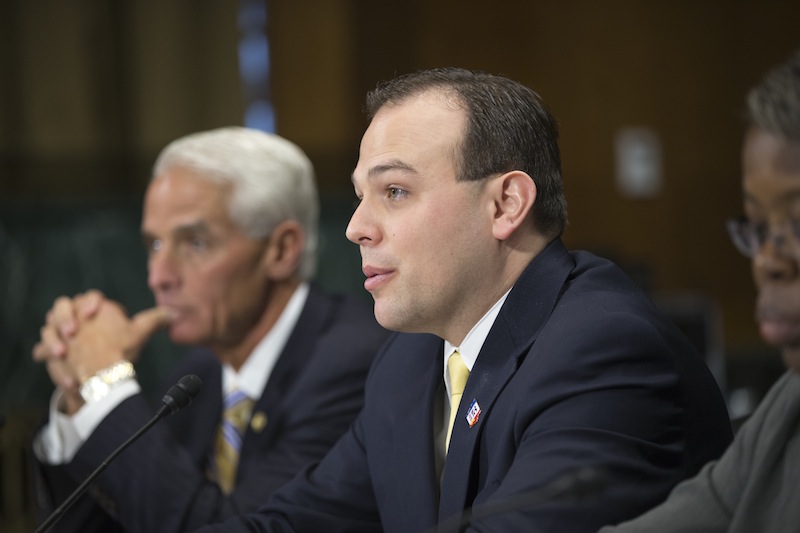The Iowa chapter of the American Civil Liberties Union and the League of United Latin American Citizens of Iowa have sued Iowa Secretary of State Matt Schultz (R) over a rule that aims to remove names from voter rolls if a federal immigration database suggests they are not authorized to vote.
The ACLU and the LULAC filed a legal motion in Iowa’s Polk County on Wednesday asking the judge to issue a ruling in the lawsuit, originally filed last year, and permanently block Schultz’s rule. Schultz was given tentative permission to use the rule Aug. 14. If the judge approves the request, the activists will have successfully stopped the proposed voter roll purge.
The rule in question allows Schultz’s office to cross reference self-identified non-citizens on voter registration rolls with the Systematic Alien Verification for Entitlements (SAVE) program, which the Department of Homeland Security operates. The SAVE program retains information on immigrants in the country on a temporary visa. If a non-citizen on the SAVE list is also listed as a registered voter a letter is sent to the registrant telling him or her that he or she might be illegally registered to vote. If the voter does not respond to that first letter, a second letter is sent reminding “the individual that registering to vote without citizenship is a felony,” according to Schultz’s office. After the second letter a voter might have to appear before a hearing to present evidence on voter eligibility.
“If the person cannot prove citizenship after this process, the office will forward the information to the county and after their registration has been challenged, the county auditor must hold a hearing to determine the eligibility of the voter,” also according to Schultz’s office.
Joseph Henry, president of the LULAC, said Schultz’s effort is just to intimidate Latino voters. “He wants to use it so he can have leverage to send out scare letters,” Henry said.
The lawsuit additionally argues that Schultz doesn’t have the authority to enforce the rule.
The flaw in Schultz’s system, The Ohio State University Moritz College of Law Professor Daniel Tokaji said to TPM on Thursday, is that the SAVE program was not designed for keeping track of legal voters. Tokaji stressed that he had not examined the case closely but said that the type of cross-referencing Schultz wants to do under the rule creates the possibility that legal voters are mistakenly purged from voter rolls.
“There are just a lot of mistakes in these databases including voter registration rolls including mistyped addresses” or other basic information, Tokaji said.
The Immigration Policy Center has previously argued that SAVE has a complex and little-understood process for correcting errors in its system and its website “provides no information about a remedy when verification is done in connection with other purposes.”
Myrna Pérez, the deputy director of the Brennan Center for Justice at New York University, said there were other examples beyond voting where cross-referencing databases fail.
“Sometimes we can see examples of this in terms of states that are trying to look at bureau of vital statistics records on who died,” Pérez said. “In this case the SAVE database, which is what they’re planning to use, was not designed to tell somebody whether they’re eligible to vote.”
Pérez added that the SAVE database is just designed to keep data on immigration proceedings.
Schultz argued in his response to the lawsuit that the rule is a necessary addition to cut down on voter fraud.
“It’s a tool we will use to ensure election integrity without suppressing eligible voters,” Schultz said in a statement from his office. “While the ACLU may not care about election integrity, it’s my job to do so in a thoughtful, common-sense way. The process of utilizing the SAVE database may take some time, but ensuring election integrity without voter suppression has been and will continue to be my approach.”
Legal experts contacted by TPM were wary about speculating whether, as Democratic critics of new voting laws often argue, Schultz’s rule is meant to disenfranchise minority voters, but said the rule could serve to intimidate those voters.
“I am always weary when a partisan election official takes an action in the name of ‘election integrity’ without actual evidence that there is a problem that needs fixing,” University of Kentucky College of Law Professor Josh Douglas, who specializes in election law, said to TPM in an email. “It appears that there is merely speculation that Iowa’s voter rolls have a lot of immigrants, and that these people actually try to vote and are successful at doing so.
Douglas also said he was concerned by the letters under Schultz’s rule.
“We saw the same kind of scare tactic right before the 2012 election when there were billboards put up in poor neighborhoods of some states saying that voter fraud is a felony,” Douglas continued. “Then again, the process does have some merit, in that the voters will receive multiple letters notifying them of the mismatch.”
Pérez said the real question with the rolls is whether they actually do clean the voter rolls while mistakenly removing legal voters.
“The question becomes what steps are reasonable, appropriate, and lawful in terms of ensuring that these rolls are clean and while county election officials should make a great effort to keep our rolls extraordinarily clean much greater [presence and oversight] must be given,” Pérez added.






